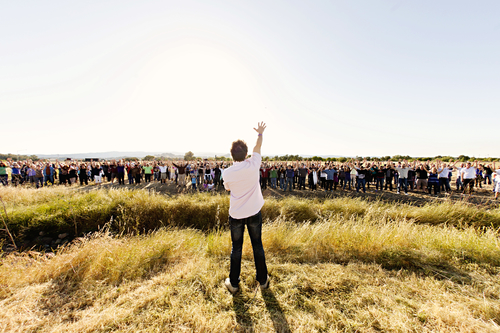Your year-end generosity to Enduring Word is appreciated. Click here to donate.
Then Philip went down to the city of Samaria and preached Christ to them. And the multitudes with one accord heeded the things spoken by Philip, hearing and seeing the miracles which he did. For unclean spirits, crying with a loud voice, came out of many who were possessed; and many who were paralyzed and lame were healed. And there was great joy in that city. (Acts 8:5-8)
Philip was a man like Stephen – one of the men chosen to serve the church family in practical ways when the dispute regarding Hellenist widows arose (Acts 6:5). He was one of those forced to flee persecution, and he ended up in Samaria.
Once in Samaria, Philip knew what to do: he preached Christ to them. After many of the Jews had rejected the gospel again, we see God extending the offer of salvation in Jesus out to other peoples, beginning with the Samaritans.

This was Samaria and here, about 750 years before, the Assyrians conquered this area of northern Israel and deported all the wealthy and middle-class Jews from the area. Then the Assyrians moved in a pagan population from afar. These pagans intermarried with the lowest classes of remaining Jews in northern Israel, and from these people came the Samaritans.
Generally, the Jews of that day hated the Samaritans. They considered them compromising half-breeds who corrupted the worship of the true God. There was a long-standing hatred between many of the Jews and many of the Samaritans.
Jesus’ experience with the Samaritan woman at the well (John 4) and His story about the kindness of a Samaritan (Luke 10:25-37) illustrate the natural tension between the Jews and Samaritans of that time. Remember that James and John (and the other disciples as well) once thought that the Samaritans were only good for being burned by God’s judgment (Luke 9:51-56).
Yet, Philip preached Christ to them. Because Jesus had worked in him there was no room for this kind of prejudice in his heart or mind. He wasn’t a racist towards the Samaritans.
Philip came presenting the gospel, with signs and wonders following as an impressive confirmation. Philip also made an impact when the people saw the miracles which he did. When the responded to the gospel and found Jesus, there was great joy in that city.
Undoubtedly, one reason there was such fruit was that Jesus had sown the seed in Samaria during His ministry (John 4:1-26). Now Philip reaped the harvest.
Remember the whole reason Philip was in Samaria – because Christians in Jerusalem were being arrested, beaten, and even murdered for the sake of Jesus. He and others fled the destruction and danger.
The great joy in that city came from great sorrow and pain in Jerusalem. It came from the reality of spiritual power (the miracles which he did). But it especially came as Philip preached Christ to them.
Even today, God can use pain of His people, the power of the Spirit, and the preaching of Christ.
Click Here for David’s Written Commentary on Acts 8
The post Pain, Power, Preaching appeared first on Enduring Word.


0 Commentaires